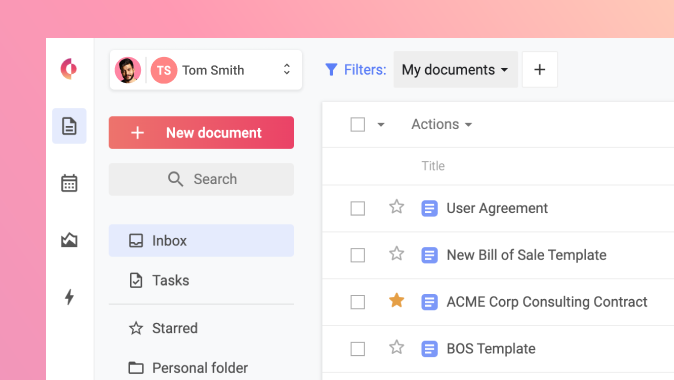Pay Up? Why You Shouldn’t Have to Pay for E-Signature
You’ve just signed a document at a bank, a leasing office, or for a brand new phone. Probably, you’re pretty excited about the new purchase! But then something peculiar happens. They ask you to pay for your signature. Likely, you’ve just paid a lot for something in the contract, and it would be surprisingly poor service to pay for your own signature.
Paying to sign is not how contracts work in your everyday life, and electronic document signing should feel the same. Of course, you’re not actually asking someone to pay for their signature, but you are being charged to provide electronic signatures.
Before you think we’re yelling “E signature Liberté!” next to a Bastille (Our founders are French, but we promise, this has never occurred), there’s a more practical, long-term reason why you shouldn’t have to pay for electronic signature, and what to invest in, instead.
E-Signature as a Service is Limited
In 2021, whether it’s an electronic signature vs digital signature, there are more than 65 apps or software on the market that offer some form of e signature tool, many of which have come to market in the past 7 to 9 years.
For business professionals and casual consumers alike, word processors and digital documents are taken for granted as part of the fabric of daily life and business. But, electronic signatures are still perceived as novel technology. It’s as if the service seems late to the game. Indeed, legislation to make a signature legally binding lagged behind the technology.
Still, while the market has been occupied with delivering on new e signature and digital signature tools to meet the need for this most essential of business requirements—affirming an agreement with a signature—technology has continued to outpace this need. In a sense, paying for a basic e signature tool is a helpful doorway to better, efficient business, but it’s a first step.
By and large, when you pay for electronic signatures, you are paying for three steps: Uploading, Signing it, and Storing in some form. Most providers also offer signature notification tracking and an integrated storage solution within these, but contract management requires additional steps.
These steps don’t entirely support all the stages of contract management, and limit you to using disconnected tools to manage contracts. So it still doesn’t solve the frustrations and bottlenecks that arise in your contract negotiation, in redlining, version control, or deadline tracking. It can still take 45% of businesses surveyed up to a week to get a document signed, let alone manage these other fundamental steps in a contract.
Contract Management is Different Than Document Management
Contract management isn’t the same as document management. You might be thinking that’s a no-brainer (and thank you Captain Obvious) . Of course–not all documents require a signature. But what you’re paying for with an e signature solution often doesn’t match that simple concept. Many services tout document management as part of their e signature plan, but most services are storage solutions. Storage solutions don’t directly enable you to manage details within the contract.
Still, about 77% of business owners want to be able to access any documents remotely, says Finances Online. So e-signature software can feel enticing as a handy solution.
But in actuality, you’re paying for the beginning steps of contract management services built-out around the signature action. So what you’re investing in is a system that’s limited, and for one that doesn’t solve operational needs or scale for business growth.
A paid e-signature solution is like getting a seat at a great game, whereas automating the entire contract management process is like getting the best seat at that game—where we’re happy to share all of our (popcorn) kernels of contract management knowledge.
E-Signature Scratches the Need – Contract Management “Salves” It
In your office, no matter if it’s a small construction firm, legal office, or education, procurement, or healthcare organization, electronic signature software probably feels like a satisfying service. But getting to that signature is less so.
Raise your digital hand if you:
- Recreated a document because you couldn’t find the last one a former colleague created.
- Lost a document in email transmission. Possibly you’ve had more than one email threads with this recipient, and tracking these makes it difficult to locate an important change or term.
- Do not have a PDF editor at your company (and you wonder why you don’t).
You’re not alone if you said yes to each of these.
Data shows that the majority of business professionals are right there with you, in that productivity sinkhole. In one recent survey, only 28% of businesses surveyed relayed that they have digitized every step of the contract process.
Electronic signature software can pull you part of the way out of that hole. Whereas contract management software gives you a hand at every leg of these productivity pitfalls.
Does This Sound Familiar?
Your sales reps, with their steady skills, led new clients in the door. Rather, at the threshold of the door, because the contract is still in legal review.
Partners have negotiated a contract, versions have gone through email back-and-forth, everyone has agreed to the terms, and the final version has been printed out for signature, and unfortunately, this process takes weeks or months.
As a procurement analyst, company controller, sales director, or your own business owner, you want to analyze a particular line of business revenue against what you targeted. Or, you want to get a sense of inventory turnover within a certain timeframe. These numbers are critical. They help you garner more capital for your company and make necessary business and operational decisions.
In another recent survey, 69% of respondents say they’ve made critical decisions based on inaccurate financial information. What’s to blame? Human error.
Contract Management Automation for Every Business Case
Automated contract management solves each of these problems. It reduces human error, lag time, and negotiation hold-ups. Sending and requesting electronic signatures is part of the contract process. But those other parts are essential, too.
If you’re in Procurement, Sales, Legal, HR, Healthcare or Education, Concord features solutions for any organization, for every stage of contract management, with:
- Template Building
- Editing in real time
- Setting conditions for approvals based on field values or content
- Security
- Renewal and deadline tracking
- Storage
- Reporting
And, when it comes to electronic signatures, Concord provides unlimited signatures, as well as unlimited viewers (so anyone can track the status, and data of any contract).
Start with E-Signature Ease to Create Contract Management Consistency
By now, you probably have a better understanding of how to think about electronic signature plans. In the same way that MP3 players, once new and pricey, became obsolete, e signature plans are a start, but they stand to become outdated.
Your organization may need to do the two-step. You may have taken a first step in paying for an electronic signature plan. Concord’s made it easy to take that second step, to full contract automation, with a free trial and plans for every size of business and budget. You’ll never have to track the amount of signatures you send and receive. There is no limit!
You can take a few minutes to sign-up for a free trial, and also sign-up for Concord’s free short weekly training session and Q&A, so you can save your team hours, weeks, and months in getting to the signature.



